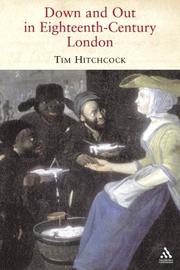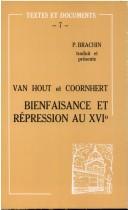| Listing 1 - 8 of 8 |
Sort by
|
Book
ISBN: 1861341784 9786612318153 1282318152 1847425046 Year: 1999 Publisher: Bristol, UK : Policy Press,
Abstract | Keywords | Export | Availability | Bookmark
 Loading...
Loading...Choose an application
- Reference Manager
- EndNote
- RefWorks (Direct export to RefWorks)
Though begging is intimately linked to issues of street homelessness, mental health, substance abuse and social exclusion, this book focuses on begging as a distinctive form of marginalised economic activity. It uniquely brings together contributions from academics, as well as taking into account the voices of beggars themselves and of passers-by.
Beggars --- Begging --- Mendicancy --- Panhandling --- Poverty --- Vagrancy --- Mendicants --- Panhandlers --- Street people (Beggars) --- Poor --- Government policy
Book
ISBN: 9783631569443 Year: 2007 Volume: 4 Publisher: Frankfurt am Main [etc.] Peter Lang
Abstract | Keywords | Export | Availability | Bookmark
 Loading...
Loading...Choose an application
- Reference Manager
- EndNote
- RefWorks (Direct export to RefWorks)
Beggars --- Begging --- Poor --- Disadvantaged, Economically --- Economically disadvantaged --- Impoverished people --- Low-income people --- Pauperism --- Poor, The --- Poor people --- Persons --- Social classes --- Poverty --- Mendicancy --- Panhandling --- Vagrancy --- Mendicants --- Panhandlers --- Street people (Beggars) --- History --- Economic conditions
Book
ISBN: 9062836380 9789062836383 Year: 1985 Volume: 4 Publisher: Muiderberg Coutinho
Abstract | Keywords | Export | Availability | Bookmark
 Loading...
Loading...Choose an application
- Reference Manager
- EndNote
- RefWorks (Direct export to RefWorks)
History of the law --- Coornhert, Dirck Volckertszoon --- Begging --- Rogues and vagabonds --- History. --- Prevention. --- History --- Prevention --- -Begging --- -Rogues and vagabonds --- -34 <09> --- Vagabonds --- Vagrants --- Homeless persons --- Brigands and robbers --- Tramps --- Mendicancy --- Panhandling --- Poverty --- Vagrancy --- Rechtsgeschiedenis --(algemeen) --- 34 <09> Rechtsgeschiedenis --(algemeen) --- 34 <09> --- Rogues and vagabonds - Netherlands - History --- Begging - Netherlands - History --- Begging - Netherlands - Prevention

ISBN: 9781852855529 1852855525 Year: 2007 Publisher: Hambledon Continuum
Abstract | Keywords | Export | Availability | Bookmark
 Loading...
Loading...Choose an application
- Reference Manager
- EndNote
- RefWorks (Direct export to RefWorks)
This title examines how beggars operated in 18th-century London and how begging, and demands for charity, formed part of everyday life and work.
Poor --- Begging --- History --- London (England) --- Social conditions --- Mendicancy --- Panhandling --- Poverty --- Vagrancy --- Disadvantaged, Economically --- Economically disadvantaged --- Impoverished people --- Low-income people --- Pauperism --- Poor, The --- Poor people --- Persons --- Social classes --- Economic conditions --- Londen (England) --- Londinium (England) --- Londres (England) --- Londýn (England) --- Lunnainn (England)

ISBN: 2711608476 Year: 1984 Volume: 7 Publisher: Paris : Librairie J. Vrin,
Abstract | Keywords | Export | Availability | Bookmark
 Loading...
Loading...Choose an application
- Reference Manager
- EndNote
- RefWorks (Direct export to RefWorks)
History of the law --- anno 1500-1599 --- Begging --- Charity laws and legislation --- Mendicité --- Oeuvres de bienfaisance --- History --- Prevention --- Histoire --- Prévention --- Droit --- Rogues and vagabonds --- History. --- Prevention. --- Mendicité --- Prévention --- Mendicancy --- Panhandling --- Poverty --- Vagrancy --- Vagabonds --- Vagrants --- Homeless persons --- Brigands and robbers --- Tramps --- Tuchthuizen. Nederland, Geschiedenis (Leerstellige). 16e eeuw. --- Pauvreté. Pays-Bas. Histoire doctrinale. 16e s. --- Maisons de correction. Pays-Bas. Histoire doctrinale. 16e s. --- Armoede. Nederland. Geschiedenis (Leerstellige). 16e eeuw.

ISBN: 3515054596 Year: 1990 Publisher: Stuttgart Steiner
Abstract | Keywords | Export | Availability | Bookmark
 Loading...
Loading...Choose an application
- Reference Manager
- EndNote
- RefWorks (Direct export to RefWorks)
Begging --- -Crime --- -Poor --- -Disadvantaged, Economically --- Economically disadvantaged --- Impoverished people --- Low-income people --- Pauperism --- Poor --- Poor, The --- Poor people --- Persons --- Social classes --- Poverty --- City crime --- Crime --- Crime and criminals --- Crimes --- Delinquency --- Felonies --- Misdemeanors --- Urban crime --- Social problems --- Criminal justice, Administration of --- Criminal law --- Criminals --- Criminology --- Transgression (Ethics) --- Mendicancy --- Panhandling --- Vagrancy --- History --- Economic conditions --- Social aspects --- Rhine River Valley --- -Rhine River Valley --- -Rhine Valley --- Social conditions --- -History --- -Economic conditions --- Disadvantaged, Economically --- Rhine Valley --- Economic conditions. --- Social conditions.
Book
ISBN: 906321507X Year: 1988 Volume: 16. Publisher: Antwerpen Kluwer rechtswetenschappen
Abstract | Keywords | Export | Availability | Bookmark
 Loading...
Loading...Choose an application
- Reference Manager
- EndNote
- RefWorks (Direct export to RefWorks)
Criminal law. Criminal procedure --- Sociology of law --- thuislozen --- Social problems --- Social policy and particular groups --- Armoede --- Assistance sociale --- Criminologie --- Droit pénal --- Maatschappelijk werk --- Pauvreté --- Strafrecht --- Vagrancy --- Begging --- Homelessness --- Mendicité --- History. --- Histoire --- 343.345 --- 351.763 --- -Begging --- -Homelessness --- -343.345 <493> --- 351.763 <493> --- #C9206 --- landloperij --- armoede --- sociale geschiedenis --- gevangeniswezen --- OCMW --- bedelarij --- Housing --- Poverty --- Homeless persons --- Mendicancy --- Panhandling --- Vagabondage --- Crime --- Bedelarij. Landloperij --- Maatregelen i.v.m. bedelarij, landloperij --- History --- 362.9 --- 339.1 --- 308 --- 343.8 --- 362.5 --- 351.763 Maatregelen i.v.m. bedelarij, landloperij --- 343.345 Bedelarij. Landloperij --- Mendicité --- 343.345 <493> --- Government policy --- Belgium
Book
ISBN: 1786949539 1789629004 1786941570 Year: 2018 Publisher: Liverpool : Liverpool University Press,
Abstract | Keywords | Export | Availability | Bookmark
 Loading...
Loading...Choose an application
- Reference Manager
- EndNote
- RefWorks (Direct export to RefWorks)
An Open Access edition of this book is available on the Liverpool University Press website and the OAPEN library.
Beggars and begging were ubiquitous features of pre-Famine Irish society, yet have gone largely unexamined by historians. This book explores at length for the first time the complex cultures of mendicancy, as well as how wider societal perceptions of and responses to begging were framed by social class, gender and religion. The study breaks new ground in exploring the challenges inherent in defining and measuring begging and alms-giving in pre-Famine Ireland, as well as the disparate ways in which mendicants were perceived by contemporaries. A discussion of the evolving role of parish vestries in the life of pre-Famine communities facilitates an examination of corporate responses to beggary, while a comprehensive analysis of the mendicity society movement, which flourished throughout Ireland in the three decades following 1815, highlights the significance of charitable societies and associational culture in responding to the perceived threat of mendicancy. The instance of the mendicity societies illustrates the extent to which Irish commentators and social reformers were influenced by prevailing theories and practices in the transatlantic world regarding the management of the poor and deviant. Drawing on a wide range of sources previously unused for the study of poverty and welfare, this book makes an important contribution to modern Irish social and ecclesiastical history.
'McCabe initiates a much needed shift in focuses from the urgent response to a humanitarian crisis in the wake of the potato blight to a comprehensive analysis to how Irish society tackled the challenges and instituted a framework to meet the needs of the most vulnerable on a daily basis. In this way, McCabe's book is essential reading when considering the ways an analysis of class, gender and religion in Pre-Famine Ireland illuminates how a growing sense of social awareness not only surfaced in this period but shaped the way Irish society would define and advance itself into the modern era.'
Victoria Anne Pearson, Women's History Association Ireland
Begging --- Charities --- Alms and almsgiving --- Benevolent institutions --- Charitable institutions --- Endowed charities --- Institutions, Charitable and philanthropic --- Philanthropy --- Poor relief --- Private nonprofit social work --- Relief (Aid) --- Social welfare --- Associations, institutions, etc. --- Poor --- Social service --- Endowments --- Mendicancy --- Panhandling --- Poverty --- Vagrancy --- History --- Societies, etc. --- Services for --- Ireland --- Social conditions --- Social conditions. --- Famines. --- Charity --- Charities. --- Begging. --- Famines --- Charité --- Mendicité --- Religious aspects --- Christianity. --- Aspect religieux. --- Histoire --- Ireland. --- Irlande --- Conditions sociales --- Theological virtues --- Famine --- Food supply --- Starvation --- Airlann --- Airurando --- Éire --- Irish Republic --- Irland --- Irlanda --- Irlanti --- Írország --- Poblacht na hÉireann --- Republic of Ireland --- Descriptive sociology --- Social history --- Sociology --- アイルランド --- Irish Free State --- British & Irish history --- urban --- Irish --- rural --- poor --- social history --- nineteenth century --- poverty --- begging --- charity
| Listing 1 - 8 of 8 |
Sort by
|

 Search
Search Feedback
Feedback About UniCat
About UniCat  Help
Help News
News